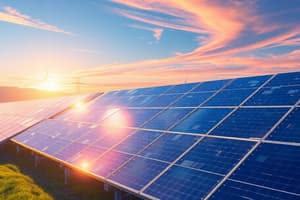Podcast
Questions and Answers
What is the primary function of an inverter system?
What is the primary function of an inverter system?
- To synchronize with the grid's frequency and voltage
- To convert DC power from solar panels to AC power for use in homes or businesses (correct)
- To measure the percentage of sunlight converted into electrical energy
- To optimize energy output at the panel level
What is the typical efficiency range of a grid-tied inverter?
What is the typical efficiency range of a grid-tied inverter?
- 90-92%
- 95-98% (correct)
- 75-80%
- 80-85%
What is the primary benefit of net metering in grid-connected systems?
What is the primary benefit of net metering in grid-connected systems?
- It allows excess energy to be stored in batteries
- It increases grid stability by reducing energy consumption
- It reduces energy bills by increasing energy production
- It allows excess energy to be fed back into the grid and offset energy consumption (correct)
What is the primary factor affecting panel efficiency?
What is the primary factor affecting panel efficiency?
What type of solar cells are made from a variety of materials?
What type of solar cells are made from a variety of materials?
What is the typical efficiency range of monocrystalline silicon solar panels?
What is the typical efficiency range of monocrystalline silicon solar panels?
What is the primary advantage of microinverters?
What is the primary advantage of microinverters?
What is the primary benefit of grid-tied systems?
What is the primary benefit of grid-tied systems?
What is the primary material used in crystalline silicon (c-Si) solar cells?
What is the primary material used in crystalline silicon (c-Si) solar cells?
What is the primary process by which solar cells convert sunlight into electrical energy?
What is the primary process by which solar cells convert sunlight into electrical energy?
What is the term for the energy from light that is absorbed by semiconducting materials?
What is the term for the energy from light that is absorbed by semiconducting materials?
What is the purpose of an inverter in a solar panel system?
What is the purpose of an inverter in a solar panel system?
What is the term for a group of solar cells connected in series and parallel?
What is the term for a group of solar cells connected in series and parallel?
What is the ratio of electrical energy output to incident sunlight energy?
What is the ratio of electrical energy output to incident sunlight energy?
What is the term for the total energy produced by a solar panel system over a period?
What is the term for the total energy produced by a solar panel system over a period?
What is the term for the measure of available solar energy per day?
What is the term for the measure of available solar energy per day?
What is the process by which electrons and holes are separated, creating an electrical potential difference?
What is the process by which electrons and holes are separated, creating an electrical potential difference?
What is the ratio of actual energy production to maximum possible energy production?
What is the ratio of actual energy production to maximum possible energy production?
Flashcards are hidden until you start studying
Study Notes
Inverter Systems
- Convert DC power from solar panels to AC power for use in homes or businesses
- Types of inverters:
- String inverters: connected to a string of solar panels
- Microinverters: connected to individual solar panels
- Power optimizers: optimize energy output at the panel level
- Inverter efficiency: measures the percentage of DC power converted to AC power
- Typical inverter efficiency: 95-98%
Grid Connection
- Grid-tied systems: synchronize with the grid's frequency and voltage
- Net metering: allows excess energy to be fed back into the grid and offset energy consumption
- Grid connection benefits:
- Sell excess energy back to the grid
- Reduce energy bills
- Increase grid stability
Panel Efficiency
- Measures the percentage of sunlight converted into electrical energy
- Factors affecting panel efficiency:
- Temperature: high temperatures reduce efficiency
- Shading: reduces energy output
- Reflection: reduces energy output
- Typical panel efficiencies:
- Monocrystalline silicon: 15-20%
- Polycrystalline silicon: 12-15%
- Thin-film: 7-14%
Solar Cell Materials
- Crystalline silicon (c-Si):
- Most common material used in solar cells
- High efficiency, but high production costs
- Thin-film solar cells:
- Made from a variety of materials (e.g. amorphous silicon, CdTe)
- Lower efficiency, but lower production costs
- Emerging materials:
- Perovskite solar cells: high efficiency, low production costs
- Bifacial solar cells: capture energy from both sides of the panel
Studying That Suits You
Use AI to generate personalized quizzes and flashcards to suit your learning preferences.





